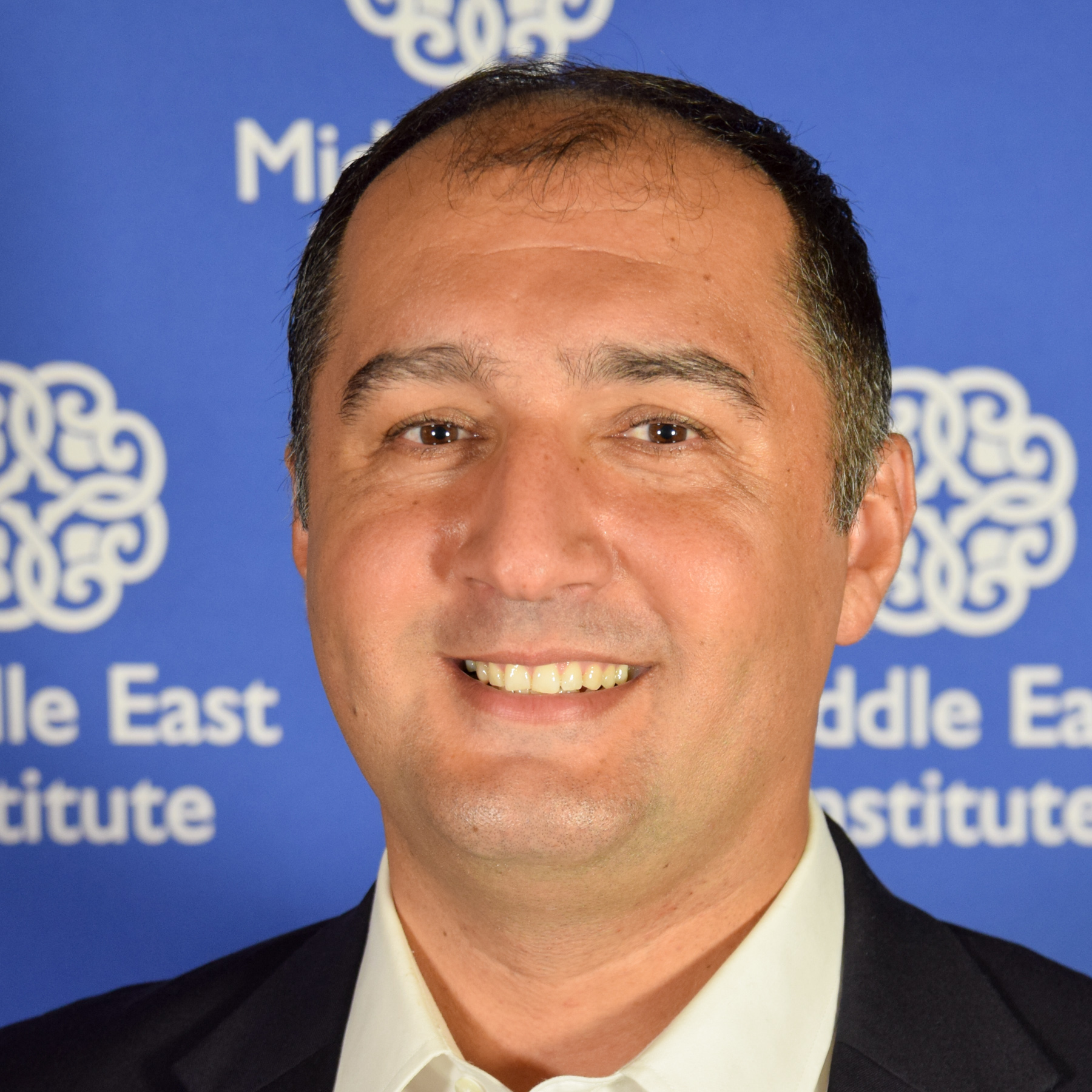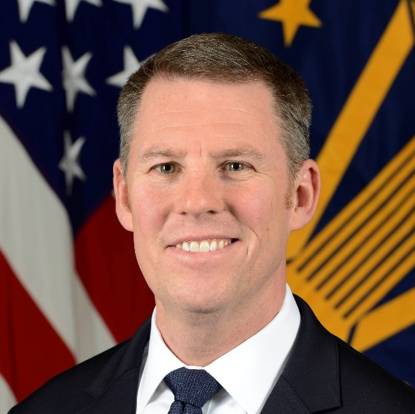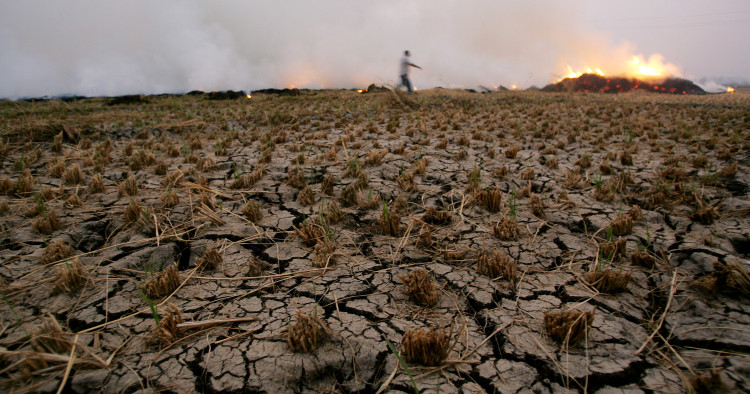Contents:
- Water scarcity is a regional problem and needs a regional solution
- Israeli elections: Fourth edition
- Abu Dhabi a no-show in Israeli elections
- State Department memo outlines “reset” of US-Palestinian relations
- US military presence in Afghanistan should be based on facts on the ground
- Cellebrite halts sales to Belarus and Russia
- The opposition party alliance in Pakistan splits
- Growing tension in US-Ethiopia relations
- The CIA’s new director
Water scarcity is a regional problem and needs a regional solution
Alex Vatanka
Director of Iran Program and Senior Fellow, Frontier Europe Initiative

In recent years, Iranian authorities have invested much political and financial capital in the promise of dealing with the growing problem of water scarcity. A number of initiatives are in motion but few are as controversial as plans to transfer water from the Persian Gulf and the Sea of Oman to seven water-poor provinces in central Iran. This national water transfer plan, involving four main water supply lines and a growing number of desalination plants that are to feed them, is said to cost as much as $285 billion at the official exchange rate. This is a staggering amount and little information is available about how exactly the government intends to pay for it. The plan is to complete the project by 2025 at a time when Iran remains under severe U.S.-led sanctions and suffers from very limited financial maneuverability.
The project is touted as one that can create some 70,000 jobs, supply both heavy industries and Iran’s extensive agricultural sector, while also saving precious underwater resources. The availability of water is also meant to prevent rural migration to cities by enabling farmers to maintain a livelihood in their native regions. In any event, there is no doubt that American sanctions are partly responsible for Iran’s recent water calculations. Washington’s determination to stop Iranian oil exports has resulted in Tehran looking for alternative sources of income. Among others, water-intensive industries such as petrochemicals and mining and steel sectors have seen heightened interest since their output has eager customers in Asia, principally in China.
What, however, is inadequately discussed is the detrimental impact of such large water projects. One prime example is the effects of large-scale desalination projects. Salinization and acidification are already a problem in the Persian Gulf, home to the largest concentration of desalination plants in the world. Based on one estimate, over $7.8 billion worth of desalination projects were planned for 2020 by the Gulf states. Meanwhile, every country in the region, including Iran, is acting unilaterally even as the water source they share is a common regional asset.
In the Persian Gulf region as a whole, factors such as population growth and concurrent droughts are impacting all the littoral states. In the case of Iran, it is mostly a combination of a large but inefficient agricultural sector that is water-thirsty and government mismanagement of available water resources. While water scarcity in Iran and the rest of the Middle East is a long-term problem, some of the efforts to deal with it appear to be desperate attempts and not always carefully planned before implementation. There is certainly no sign of any collective regional effort to tackle the issue of water availability and consumption.
Today is World Water Day. For more MEI content on water scarcity and management issues, please visit our special World Water Day page.
Follow on Twitter: @AlexVatanka
Israeli elections: Fourth edition
Mark A. Heller
Non-Resident Scholar

Israelis go the polls tomorrow, for the fourth time in two years. Like the previous three election campaigns, this one does not address great domestic or foreign policy dilemmas. Little is heard about economic policy, social and economic inequalities, religion and the state, education and public health policy, Jewish-Arab relations inside the country, or future relations with the United States, Iran, or the Palestinians. Instead, the election is once again almost exclusively about one thing: Will Benjamin (“Bibi”) Netanyahu, a man indicted for bribery, fraud, and breach of trust, be allowed to continue as prime minister into the indefinite future?
Jaded observers can be forgiven for thinking that they are watching the Israeli version of “Groundhog Day.” Of course, this round is not an exact replica of those that went before. The 2021 edition includes some interesting new elements. Particularly noteworthy are the emergence of a separate faction of former Likud leaders and supporters hoping to restore to the party some of the stateliness and dignity it once had before it was transformed into a personality cult; the fissure in the United Arab List that has produced a separate Islamist party ostensibly prepared to subordinate nationalist slogans to the social and economic expectations of its Arab constituents; and the reality that Benny Ganz, the “Great White Hope” of the anti-Bibi camp, has crashed and burned, leaving his “Blue and White” Party struggling to survive.
But however interesting and potentially significant these innovations may be, the underlying logic of the election remains a contest between supporters and adversaries of Netanyahu. And because the pro- and anti-Bibi camps are so evenly divided, the probable result is yet another inconclusive outcome. Of course, the tightness of the race means that some last-second event, some small shift unidentifiable to pollsters, low turnout by anti-Bibi voters who prefer to travel abroad, or the failure of one or more smaller parties to cross the threshold (3.25%), might produce a surprise ending. However, the most probable result is indecision (perhaps accompanied by complaints of election theft and public disorder), followed by tedious bargaining, the cobbling together of another fragile coalition, and, sooner rather than later, yet another search for clarity via the election process. But barring some deus ex machina, the persistence of identity politics and proportional representation may well mean that such a search is futile.
French democracy survived the dysfunctional politics of the Fourth Republic. It remains to be seen whether Israel democracy will enjoy such a similarly lucky escape.
Abu Dhabi a no-show in Israeli elections
Gerald M. Feierstein
Senior Vice President

UAE leaders expressed annoyance over Israeli Prime Minister Benjamin Netanyahu’s blatant effort to exploit the bilateral 2020 normalization agreement, the so-called Abraham Accords, to strengthen his bid to retain his hold on the premiership in this week’s elections. “The purpose of the Abrahamic Accords is to promote a robust strategic foundation to foster peace and prosperity with the State of Israel and the wider region,” declared former Emirati minister of state for foreign affairs, Anwar Gargash. “The UAE will not be a part in any internal electioneering in Israel, now or ever.”
Despite the strong response to Netanyahu’s pre-election ploy, the Emiratis cannot have failed to understand that, from the Israeli PM’s perspective, the normalization agreements were always intended to reinforce his political standing in Israel. With the aggressive support of the former Trump administration, Netanyahu showcased the agreements with the Arab states, first and foremost, the UAE, as evidence that his hardline, pro-settler policies were not jeopardizing Israel’s standing in the world. While the UAE leadership might have been drawn to the agreement with Israel as a way of shoring up their regional position as well as gaining access to Israeli high-tech, for Netanyahu, it was always about domestic politics.
Netanyahu’s efforts to highlight the UAE-Israel relationship as part of his election campaign have been snake-bitten. Initially, plans for a Netanyahu triumphal visit to the Emirati capital were derailed by a spat with Jordan over the visit by Jordanian Crown Prince Hussein bin Abdullah to the al-Aqsa mosque. When the Israelis blocked members of Hussein’s security detail from accompanying him to Jerusalem, the Jordanians retaliated by denying Netanyahu’s plane overflight clearance en route to Abu Dhabi. Then came the Emirati slapdown of Netanyahu’s political stunt.
With Israelis headed to the polls for the fourth time in two years this week, the Emiratis are smart to want to stay out of the Israeli political debate. Already singed by their overly close embrace of Donald Trump, they recognize correctly that there is little to be gained by repeating it with the embattled Israeli PM.
State Department memo outlines “reset” of US-Palestinian relations
Nathan Stock
Non-Resident Scholar

On March 17, 2021, the UAE-based newspaper The National published excerpts from a U.S. State Department memo outlining steps to “reset” U.S. relations with the Palestinians. According to The National, the document landed on the desk of Secretary of State Antony Blinken on March 1.
Plans detailed in the memo to restart U.S. aid and development assistance to the Palestinians and to the U.N. Relief and Works Agency are obvious steps in the right direction. It is also encouraging to see proposals to roll back Trump administration regulations that allowed products produced in Israeli settlements to be labeled as hailing from Israel. Some of these steps echo similar recommendations recently forward by MEI.
That said, depending on how the Biden administration defines a “reset” with the Palestinians, the measure of success could be quite modest. Deputy Assistant Secretary of State for Israeli and Palestinian Affairs Hady Amr has already resumed contact with the Palestinian leadership, which under President Mahmoud Abbas has long placed a premium on maintaining good relations with the U.S. After years of severed relations under the Trump administration, the Biden administration was not going to have difficulty opening doors in Ramallah.
Further, while it is important not to read too much into excerpts from one memo, the ideas put forward suggest that the Biden administration is likely to have difficulty realizing its vision of advancing “a negotiated two-state solution.” The Trump administration eliminated the U.S. Jerusalem consulate as the de facto U.S. mission to the Palestinians. The memo does not commit to reopening a diplomatic mission to the Palestinians, though it suggests that options are being examined. The memo also notes Palestinian requests for U.S. help in pressuring Israel to ensure the right of Jerusalem Palestinians to vote in upcoming Palestinian elections. Despite the precedent of U.S. pressure having been instrumental in securing Jerusalem voting in the past, the memo does not commit to engaging on the matter. Aspects of the approach may even prove contradictory. It is difficult to see how “deepening” Israel’s “integration into the region” could advance a two-state solution. If anything, facilitating greater Israel-Arab normalization — without first requiring concrete concessions to the Palestinians — will leave Israel even less interested in meaningful compromise with the Palestinians.
US military presence in Afghanistan should be based on facts on the ground
Mick Mulroy
Non-Resident Senior Fellow and Co-Director of the Yemen Steering Initiative

According to media reports, the president has been given three options by the Pentagon on Afghanistan. The first is to stay with the timeline to have all troops out by May 1, 2021, the second is to extend the troop's presence indefinitely, and the third is to extend the troop presence for six months.
Because the Taliban has repeatedly violated the agreement by committing attacks on the Afghan Security Forces and the civilian population, the United States has no obligation to meet the May timeline. This leaves the choice between a specified and unspecified duration.
The assessment of how many troops are needed and the duration of their presence should be based on the facts on the ground. If the mission is to maintain a counter-terrorism capability and prevent a majority of the country from falling into the Taliban’s hands, that number will be closer to 4,500 than 2,500 and not be tied to an arbitrary deadline. It should be determined by the commander on the ground, informed by our intelligence services.
We would all like to see the conflict in Afghanistan end and our forces return home, but we do not want to lose everything we fought so hard to gain in the process. We should not leave only to have to return and fight to get to where we are today.
Follow on Twitter: @MickMulroy
Cellebrite halts sales to Belarus and Russia
Michael Sexton
Fellow and Director of MEI's Cyber Program

Cellebrite, an Israel-based company that sells technology to extract data from locked mobile devices, has halted sales to Russia and Belarus following revelations that its technology was used to target LGBTQ people and political activists, including Lyubov Sobol, a Russian lawyer associated with opposition leader Alexei Navalny. The political push to rein in Cellebrite’s sales has been spearheaded by Eitay Mack, an Israeli lawyer and human rights activist.
Cellebrite sells a tool called the “Universal Forensic Extraction Device” (UFED) to law enforcement and intelligence agencies around the world to pull data from encrypted and locked smartphone devices. The company’s technology, which was at first merely used to port users’ data as they switched cell phones, has become a critical tool for law enforcement agencies as encryption has been implemented ubiquitously across the smartphone market. Cellebrite was reported to have sold the FBI the technology to break into San Bernardino shooter Syed Rizwan Farook’s locked iPhone in 2016, although this reporting is disputed. Cellebrite can remotely deactivate UFEDs if the end user has abused the device, resold it without authorization, or otherwise violated the company’s terms of use, giving Cellebrite substantial ability to stem any abuse of its technology.
The development follows a familiar pattern. In 2020, Cellebrite halted sales to Hong Kong and China after Eitay Mack documented that UFEDs were being used to crack down on pro-democracy protesters.
The abuses of Cellebrite’s UFED and ensuing sales freezes underscore the dilemma faced by the company and the world in managing the diffusion of the underlying dual-use technology. Law enforcement in China, Russia, and Belarus all undoubtedly have legitimate investigatory needs in the face of crime, but Cellebrite cannot support those needs in legitimate cases without running the risk that its technology may eventually be used against journalists or political dissidents. Without a backdoor for law enforcement in encryption schemes — a proposal that is anathema to cryptographers and technologists — technology like Cellebrite’s is the only tool in governments’ arsenal to avoid the “going dark problem” in digital investigations.
Follow on Twitter: @MikeESexton
The opposition party alliance in Pakistan splits
Marvin G. Weinbaum
Director, Afghanistan and Pakistan Studies

Until very recently, it appeared that Pakistan’s opposition parties were going to make a serious run at deposing the Imran Khan government. Coming together as a 10-party Pakistan Democratic Movement (PDM), the opposition sought to mobilize the nation with a Long March on Islamabad and also dramatized their disdain for the regime with the massive resignation of alliance members from the National Assembly and provincial assemblies. By capitalizing on public discontent over spiraling inflation and embarrassing government missteps, the alliance hoped to force new national elections and convince the country’s military that its favored ruling party had become a liability. In capturing several parliamentary seats, the collaborating opposition had demonstrated areas of government weakness. But it also pointed to how much the alliance’s chances for eventual success depended on keeping united.
The PDM is a loose collection of largely personality-centric parties with no common goals aside from a desire to be rid of populist Khan, who is seen as a power-hungry prime minister consumed with destroying his political enemies. With the normally warring Pakistan Peoples Party (PPP) and Pakistan Muslim League-Nawaz (PML-N) as the alliance’s major components, it did not take long to run into areas of disagreement. The PPP soon distanced itself from the
PML-N decision to pick a fight with the army top brass over its involvement in civilian political affairs. The PPP also went along only tentatively with the idea of a march on the capital and broke with the PML-N and the other parties over plans for a mass resignation of seats in the national and provincial assemblies — a move that would deprive the PPP of a voice in its Sindh power base. Clashing interests were further exposed with this month’s election for open seats in Pakistan’s indirectly chosen Senate; the PPP sidelined its alliance partners only to then see itself outmaneuvered by Khan’s Pakistan Tehreek-e-Insaf (PTI) in the election of a Senate chairman and at odds with the alliance over a Senate opposition party leader.
While the opposition fights over whether to prioritize mobilizing the masses or retaining a presence in parliament, the government is riding high after consolidating its power in both houses. It will look to focus on its reform agenda but will have its hands full trying to figure out how to dampen inflation and implement IMF measures. Khan, meanwhile, is having to manage expectations from all quarters without losing support from those PTI coalition partners that keep his government afloat. More comforting for Khan is that the opposition with its several setbacks has lost momentum, and its threat to topple the Khan government has at least for the time being receded.
This article was co-authored by Ghasharib Shoukat and Jack Ryan, research assistants to Marvin G. Weinbaum.
Follow on Twitter: @mgweinbaum
Growing tension in US-Ethiopia relations
David H. Shinn
Non-resident Scholar

The outbreak of conflict in Ethiopia’s northern region of Tigray in early November last year and subsequent developments are straining relations between Washington and Addis Ababa. The proximate cause of the fighting was the attack by the ruling Tigray People’s Liberation Front (TPLF) on the central government’s northern command headquarters in Tigray’s regional capital of Mekele. The response by Ethiopian National Defense Forces (ENDF), aided by Eritrean troops and militia from the neighboring Amhara region, has resulted in numerous human rights abuses and a humanitarian crisis.
Hundreds of thousands of the 6 million Tigrayans are now internally displaced and in desperate need of food while 65,000 have taken refuge in neighboring Sudan. Atrocities by the TPLF, ENDF, Eritrean forces, and Amhara militia have ravaged Tigray region. On March 10, U.S. Secretary of State Antony Blinken described the violence as “ethnic cleansing” as he pressed during congressional testimony for a prompt investigation of human rights abuses, more aid for Tigray, and the exit of Eritrean troops.
The fighting in Tigray is playing out amid unrelated ethnic conflict in Ethiopia, a worsening border dispute between Sudan and Ethiopia, and increasing pressure from Egypt and Sudan on Ethiopia to reach agreement on the release of water behind the new Grand Ethiopian Renaissance Dam on the Blue Nile, the main source of water for the Nile. Egypt and Sudan are clearly taking advantage of Ethiopia’s internal problems to achieve their broader foreign policy objectives.
On March 18, the White House announced that Sen. Christopher Coons, Democrat of Delaware and member of the Senate Foreign Relations Subcommittee on Africa, will travel to Addis Ababa to meet with Prime Minister Abiy Ahmed to convey President Joe Biden’s “grave concerns about the humanitarian crisis and human rights abuses in the Tigray region and risk of broader instability in the Horn of Africa.” He will also consult with the African Union. The visit by Sen. Coons may well determine the future of U.S.-Ethiopian relations over the coming months.
Follow on Twitter: @AmbShinn
The CIA’s new director
Mick Mulroy
Non-Resident Senior Fellow and Co-Director of the Yemen Steering Initiative

On March 18, William J. Burns was approved by the Senate as the next director of the CIA. He will be an excellent director. He had an exceptional career as a diplomat that gave him an in-depth knowledge of some of the most critical national security issues we face. He also served as deputy secretary of state, ambassador to Russia, assistant secretary of state for Near Eastern affairs, and ambassador to Jordan, among many other critical positions.
In addition, he played a vital role in the Iran nuclear agreement, the Middle East peace process, and the elimination of Libya’s weapons program. His selection shows how important the incoming administration views the role of the CIA in the overall national security effort of the nation.
It is also important to note that then-Ambassador Burns led a recent effort to stop the State Department from designating the Houthis movement as a foreign terrorist organization, not out of any goodwill for the movement, but because of the impact that designation could have on the peace effort and the possible negative impact it could have on the delivery of humanitarian assistance to the worst humanitarian crisis in the world.
Follow on Twitter: @MickMulroy
Photo by KHALED DESOUKI / Stringer
The Middle East Institute (MEI) is an independent, non-partisan, non-for-profit, educational organization. It does not engage in advocacy and its scholars’ opinions are their own. MEI welcomes financial donations, but retains sole editorial control over its work and its publications reflect only the authors’ views. For a listing of MEI donors, please click here.













